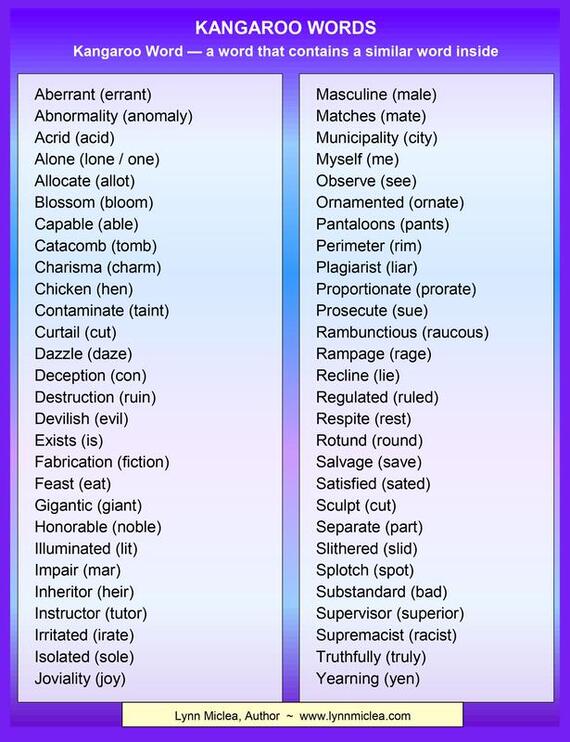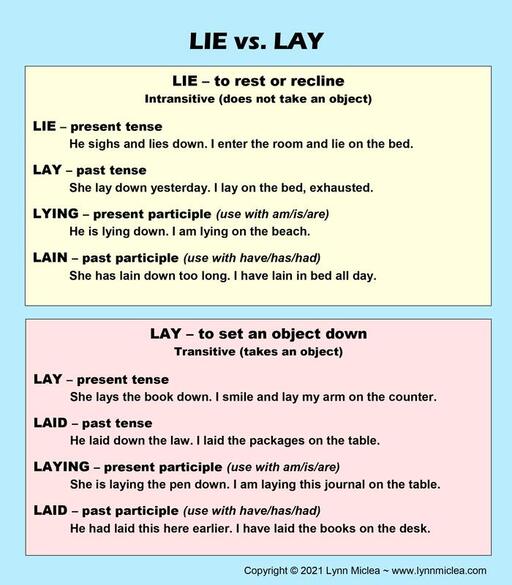
Lie versus Lay
Lie and lay are terms that people often mix up. They are not interchangeable; they have different meanings and should be used properly.
Lie means to rest or recline and is an intransitive verb, meaning it does not take an object. You lie down, he lies on the bed, she lies on the floor.
Lay means to put or place and is a transitive verb, meaning it needs an object. You lay something down, he lays the book down, she lays the file on the table, they lay down the law.
Lie and lay are terms that people often mix up. They are not interchangeable; they have different meanings and should be used properly.
Lie means to rest or recline and is an intransitive verb, meaning it does not take an object. You lie down, he lies on the bed, she lies on the floor.
Lay means to put or place and is a transitive verb, meaning it needs an object. You lay something down, he lays the book down, she lays the file on the table, they lay down the law.
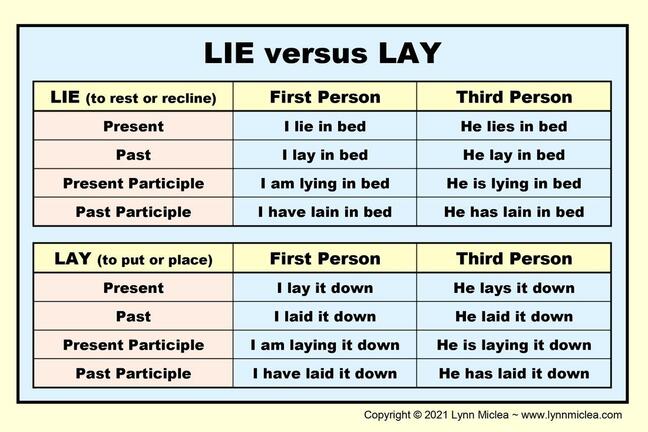
Here are two useful charts to help.
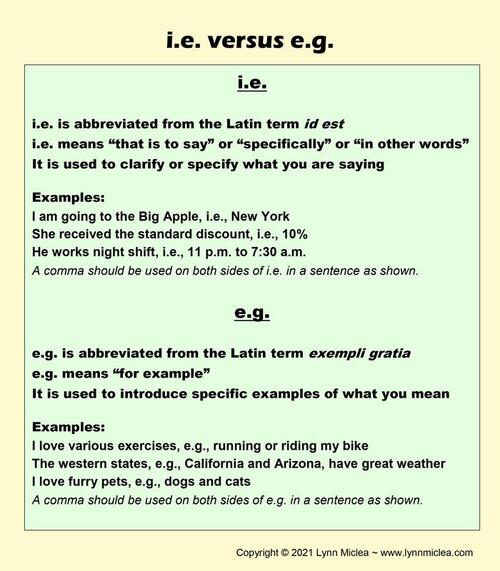
i.e. versus e.g.
People often mix up the terms i.e. and e.g. These terms are not interchangeable; they have different meanings and should be used properly.
The abbreviation i.e. is from the Latin term id est. It means "that is to say" or "in other words" and is used to clarify or specify what you are saying.
The abbreviation e.g. is from the Latin term exempli gratia. It means "for example" and is used to introduce specific examples of what you mean.
People often mix up the terms i.e. and e.g. These terms are not interchangeable; they have different meanings and should be used properly.
The abbreviation i.e. is from the Latin term id est. It means "that is to say" or "in other words" and is used to clarify or specify what you are saying.
The abbreviation e.g. is from the Latin term exempli gratia. It means "for example" and is used to introduce specific examples of what you mean.
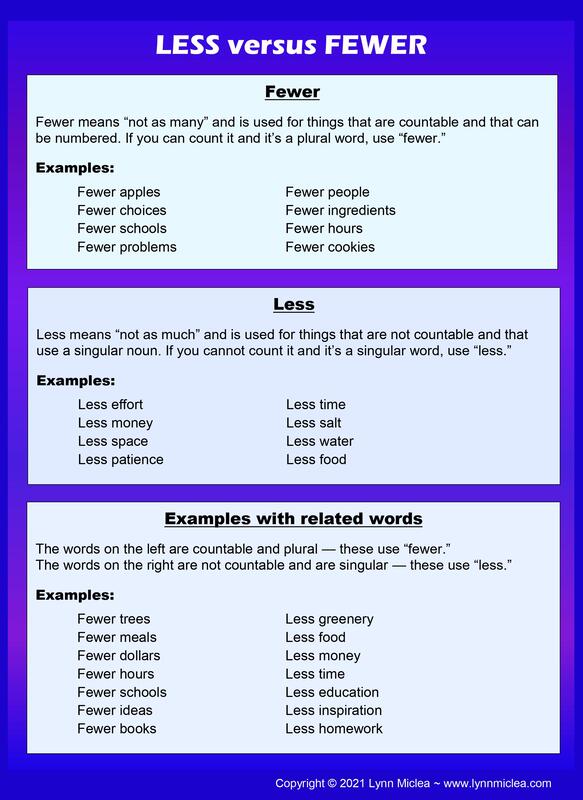
Less versus Fewer
These words have slightly different meanings and uses.
Fewer means “not as many” and is used for things that are countable or that can be numbered, and that are a plural noun.
Less means “not as much” and is used for things that are not countable and that are a singular noun.
Basically, if you can count it and it’s a plural word, use fewer.
If you can’t count it and it’s a singular word, use less.
These words have slightly different meanings and uses.
Fewer means “not as many” and is used for things that are countable or that can be numbered, and that are a plural noun.
Less means “not as much” and is used for things that are not countable and that are a singular noun.
Basically, if you can count it and it’s a plural word, use fewer.
If you can’t count it and it’s a singular word, use less.
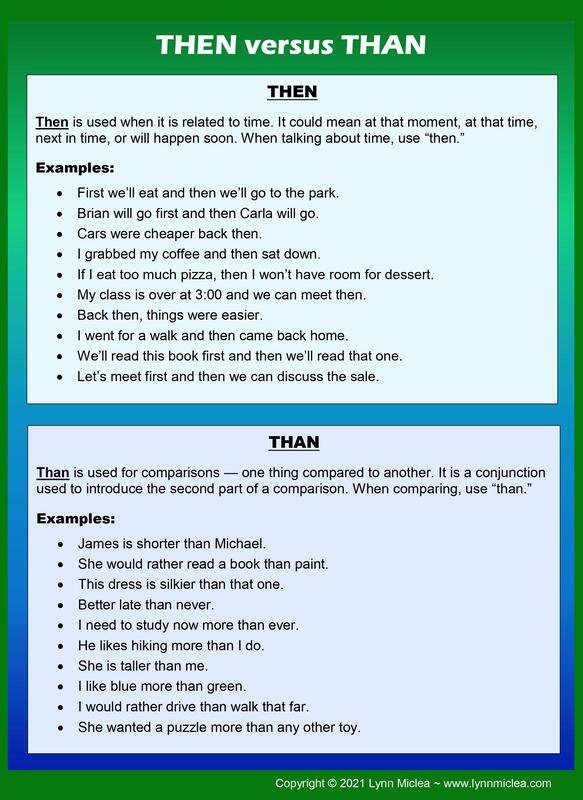
Then versus Than
These words have different meanings and uses.
Then is used when it is related to time. It could mean at that moment, at that time, next in time, or will happen soon. When you are talking about time, use then.
Than is used for comparisons — one thing compared to another. It is a conjunction used to introduce the second part of a comparison. It also can show the rejected choice when there is a preference. When you are comparing, use than.
Basically, if it relates to time, use then.
If it is a comparison, use than.
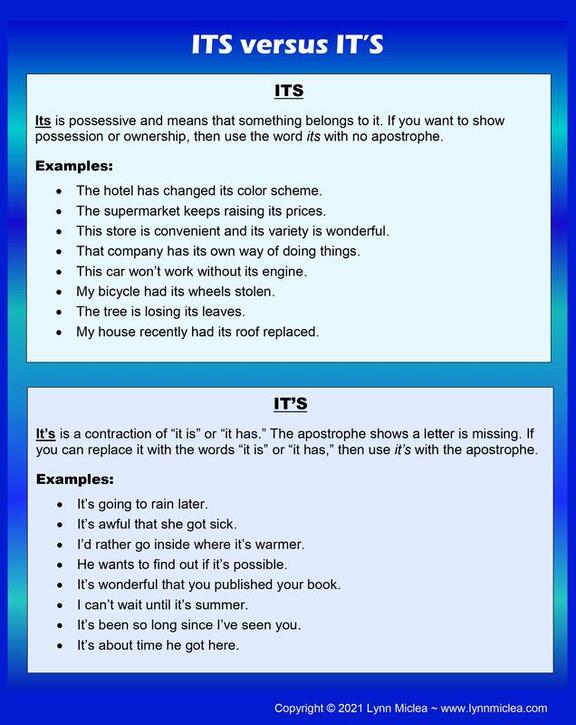
Its versus It's
People often mix up the words its and it’s. They may sound the same, but these words have different meanings and uses.
Its is possessive and means that something belongs to it. If you want to show possession or ownership, similar to the words his, her, and your, then use the word its without an apostrophe.
It’s is a contraction of “it is” or “it has.” The apostrophe shows a letter is missing. If you can replace it with the words “it is” or “it has,” then use it’s with the apostrophe.
Basically, if it is possessive or shows ownership, then use its. If it is a contraction of “it is” or “it has,” then use it’s.
A simple test: If you can substitute “it is” or “it has,” then use it’s. If not, then use its.
There is no such word as its’ — the apostrophe never goes after the s.
People often mix up the words its and it’s. They may sound the same, but these words have different meanings and uses.
Its is possessive and means that something belongs to it. If you want to show possession or ownership, similar to the words his, her, and your, then use the word its without an apostrophe.
It’s is a contraction of “it is” or “it has.” The apostrophe shows a letter is missing. If you can replace it with the words “it is” or “it has,” then use it’s with the apostrophe.
Basically, if it is possessive or shows ownership, then use its. If it is a contraction of “it is” or “it has,” then use it’s.
A simple test: If you can substitute “it is” or “it has,” then use it’s. If not, then use its.
There is no such word as its’ — the apostrophe never goes after the s.
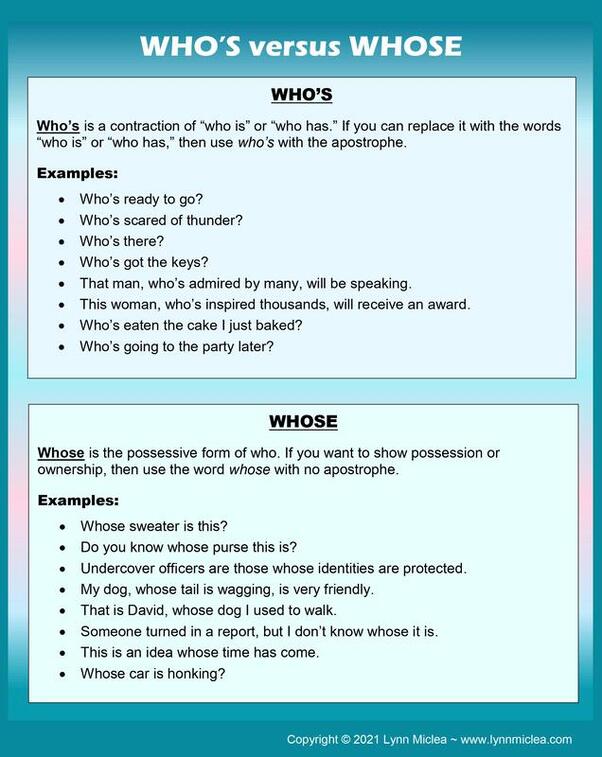
Who's versus Whose
People often mix up the words who’s and whose. They may sound the same, but these words have different meanings and uses.
Who’s is a contraction of “who is” or “who has.” The apostrophe shows a letter is missing. If you can replace it with the words “who is” or “who has,” then use who’s with the apostrophe.
Whose is the possessive form of who. If you want to show possession or ownership, then use the word whose with no apostrophe.
A simple test: If you can substitute “who is” or “who has,” then use who’s. If not, then use whose.
People often mix up the words who’s and whose. They may sound the same, but these words have different meanings and uses.
Who’s is a contraction of “who is” or “who has.” The apostrophe shows a letter is missing. If you can replace it with the words “who is” or “who has,” then use who’s with the apostrophe.
Whose is the possessive form of who. If you want to show possession or ownership, then use the word whose with no apostrophe.
A simple test: If you can substitute “who is” or “who has,” then use who’s. If not, then use whose.
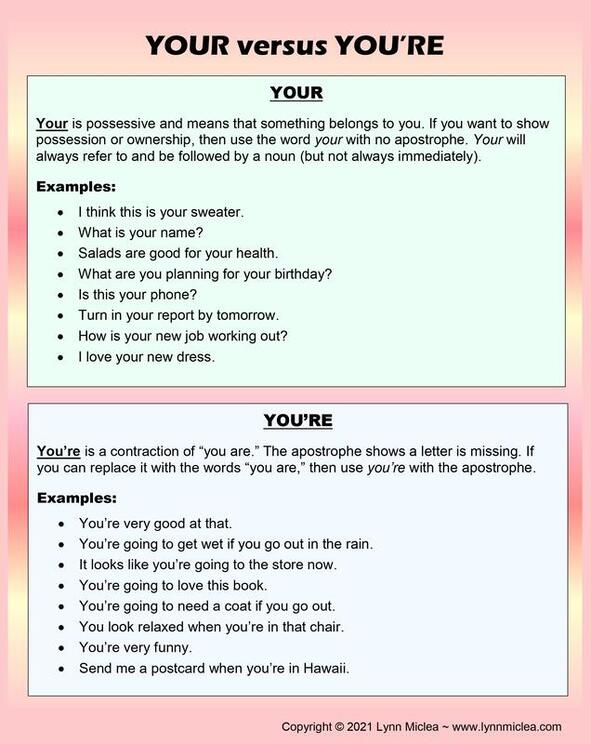
Your versus You're
People often mix up the words your and you’re. They may sound the same, but these words have different meanings and uses.
Your is possessive and means that something belongs to you. If you want to show possession or ownership, then use the word your with no apostrophe. Your is always followed by a noun in a sentence (although not always immediately).
You’re is a contraction of “you are.” The apostrophe shows a letter is missing. If you can replace it with the words “you are,” then use you’re with the apostrophe.
Basically, if it is possessive or shows ownership, then use your.
If it is a contraction of “you are,” then use you’re.
A simple test: If you can substitute “you are,” then use you’re. If not, then use your.
People often mix up the words your and you’re. They may sound the same, but these words have different meanings and uses.
Your is possessive and means that something belongs to you. If you want to show possession or ownership, then use the word your with no apostrophe. Your is always followed by a noun in a sentence (although not always immediately).
You’re is a contraction of “you are.” The apostrophe shows a letter is missing. If you can replace it with the words “you are,” then use you’re with the apostrophe.
Basically, if it is possessive or shows ownership, then use your.
If it is a contraction of “you are,” then use you’re.
A simple test: If you can substitute “you are,” then use you’re. If not, then use your.
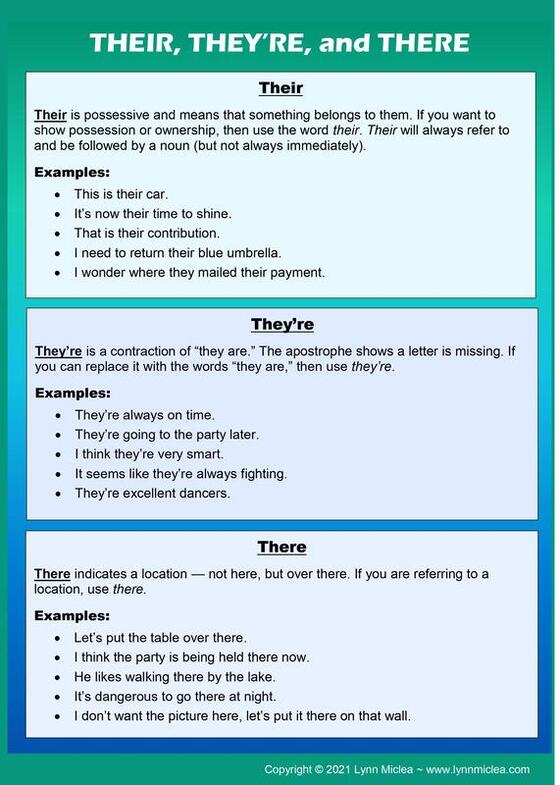
Their, They're, and There
They may sound alike, but these words have different meanings and uses.
Their is possessive and means that something belongs to them. If you want to show possession or ownership, then use the word their.
They’re is a contraction of “they are.” The apostrophe shows a letter is missing. If you can replace it with the words “they are,” then use they’re.
There indicates a location and is the opposite of here — not here, but there. If you are referring to a location, use there.
Basically, if it is possessive or shows ownership, then use their.
If it is a contraction of “they are,” then use they’re.
If it indicates a location, use there.
Another hint you can use to help.
Their has the word heir in it, which indicates possession.
They’re has an apostrophe. If you can substitute they are, then use they’re.
There has the word here in it, which indicates location.
They may sound alike, but these words have different meanings and uses.
Their is possessive and means that something belongs to them. If you want to show possession or ownership, then use the word their.
They’re is a contraction of “they are.” The apostrophe shows a letter is missing. If you can replace it with the words “they are,” then use they’re.
There indicates a location and is the opposite of here — not here, but there. If you are referring to a location, use there.
Basically, if it is possessive or shows ownership, then use their.
If it is a contraction of “they are,” then use they’re.
If it indicates a location, use there.
Another hint you can use to help.
Their has the word heir in it, which indicates possession.
They’re has an apostrophe. If you can substitute they are, then use they’re.
There has the word here in it, which indicates location.
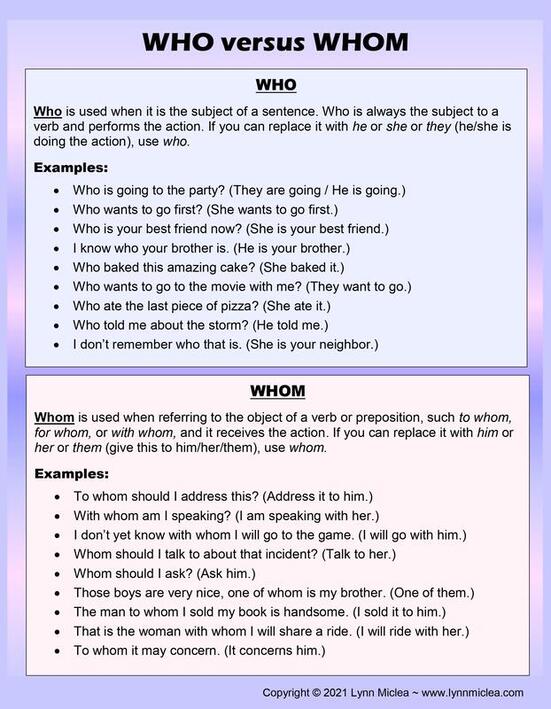
Who versus Whom
People often mix up the words who and whom, and it can be confusing to know when to use which one. However, these words have specific functions and are used differently.
Who is used when it is the subject of a sentence. Who is always the subject to a verb and performs the action. If you can replace it with he or she or they (he/she is doing the action), use who.
Whom is used when referring to the object of a verb or preposition, such to whom, for whom, or with whom, and it receives the action. If you can replace it with him or her or them (give this to him/her/them), use whom.
Basically, if it is the subject and you can substitute he, she, or they, use who.
If it is the object and you can substitute him, her, or them, use whom.
Another example: Who helped whom. / He helped her; they helped them.
People often mix up the words who and whom, and it can be confusing to know when to use which one. However, these words have specific functions and are used differently.
Who is used when it is the subject of a sentence. Who is always the subject to a verb and performs the action. If you can replace it with he or she or they (he/she is doing the action), use who.
Whom is used when referring to the object of a verb or preposition, such to whom, for whom, or with whom, and it receives the action. If you can replace it with him or her or them (give this to him/her/them), use whom.
Basically, if it is the subject and you can substitute he, she, or they, use who.
If it is the object and you can substitute him, her, or them, use whom.
Another example: Who helped whom. / He helped her; they helped them.
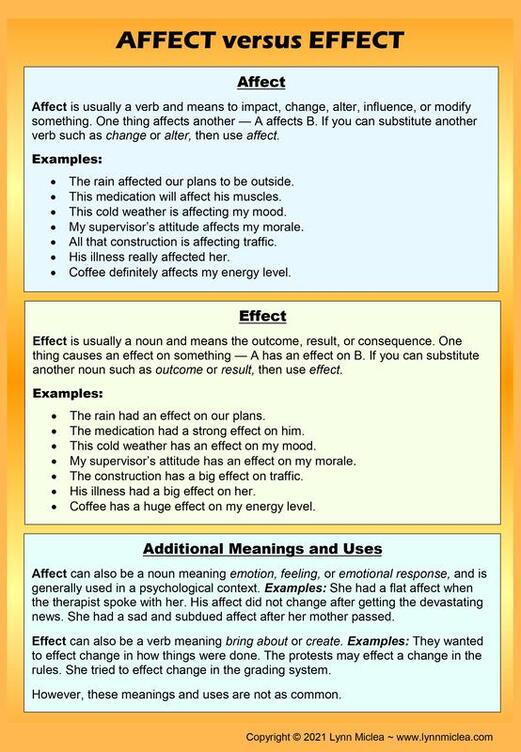
Affect versus Effect
People often mix up the words affect and effect. They may sound the same, but these words have different meanings and uses.
Affect is usually a verb and means to impact, change, alter, influence, or modify something. One thing affects another — A affects B. If you can substitute another verb such as change or alter, then use affect.
Effect is usually a noun and means the outcome, result, or consequence. One thing causes an effect on something — A has an effect on B. If you can substitute another noun such as outcome or result, then use effect.
A hint to help you remember:
A is for Action. If it is action, it starts with an “a” — use affect.
E is for End result. If it is an end result, it starts with an “e” — use effect.
A simple test: If you can substitute a verb such as alter, use affect. If you can substitute a noun such as result, use effect.
People often mix up the words affect and effect. They may sound the same, but these words have different meanings and uses.
Affect is usually a verb and means to impact, change, alter, influence, or modify something. One thing affects another — A affects B. If you can substitute another verb such as change or alter, then use affect.
Effect is usually a noun and means the outcome, result, or consequence. One thing causes an effect on something — A has an effect on B. If you can substitute another noun such as outcome or result, then use effect.
A hint to help you remember:
A is for Action. If it is action, it starts with an “a” — use affect.
E is for End result. If it is an end result, it starts with an “e” — use effect.
A simple test: If you can substitute a verb such as alter, use affect. If you can substitute a noun such as result, use effect.
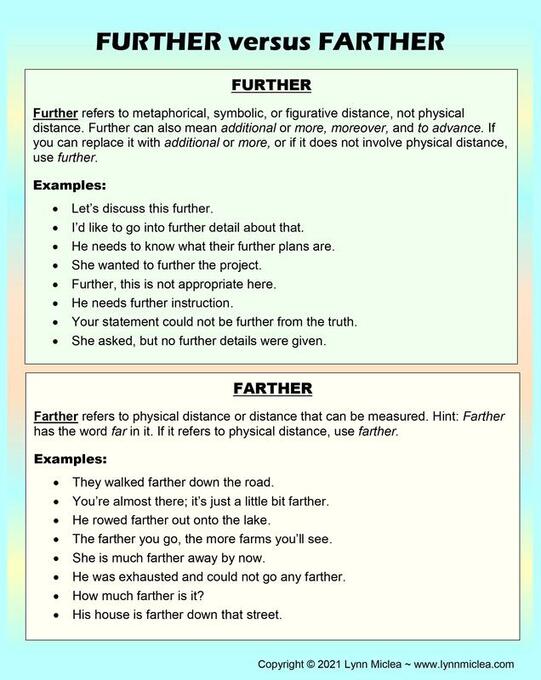
Further versus Farther
People often mix up the words further and farther. Although there is an overlap, these words are generally used in slightly different ways.
Further refers to metaphorical, symbolic, or figurative distance, not physical distance. Further can also mean additional or more, moreover, and to advance. If you can replace it with additional or more, or if it does not involve physical distance, use further.
Farther refers only to physical distance or distance that can be measured. Hint: farther has the word far in it. If it refers to physical distance, use farther.
Basically, if it refers to symbolic or figurative distance, or if you can replace it with additional or more, use further.
If it relates to physical distance, use farther.
For all other meanings other than physical distance, use further.
People often mix up the words further and farther. Although there is an overlap, these words are generally used in slightly different ways.
Further refers to metaphorical, symbolic, or figurative distance, not physical distance. Further can also mean additional or more, moreover, and to advance. If you can replace it with additional or more, or if it does not involve physical distance, use further.
Farther refers only to physical distance or distance that can be measured. Hint: farther has the word far in it. If it refers to physical distance, use farther.
Basically, if it refers to symbolic or figurative distance, or if you can replace it with additional or more, use further.
If it relates to physical distance, use farther.
For all other meanings other than physical distance, use further.
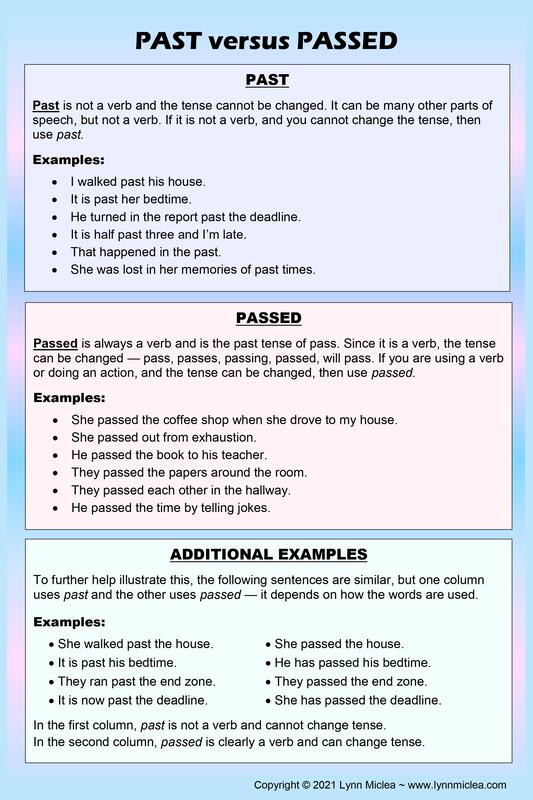
Past versus Passed
People often mix up the words past and passed. They may sound the same, but these words have different meanings and uses.
Past is not a verb and the tense cannot be changed. It can be many other parts of speech, but it is not a verb or an action itself. If it is not a verb, and you cannot change the tense, then use past.
Passed is always a verb and is the past tense of pass. Since it is a verb, the tense can be changed — pass, passes, passing, passed, will pass. If you are using a verb or doing an action, and the tense can be changed, then use passed.
A simple test: If it is a verb and you can change the tense (passed, pass, passing, will pass, passes), then use passed.
If is it not a verb and you cannot change the tense, use past.
People often mix up the words past and passed. They may sound the same, but these words have different meanings and uses.
Past is not a verb and the tense cannot be changed. It can be many other parts of speech, but it is not a verb or an action itself. If it is not a verb, and you cannot change the tense, then use past.
Passed is always a verb and is the past tense of pass. Since it is a verb, the tense can be changed — pass, passes, passing, passed, will pass. If you are using a verb or doing an action, and the tense can be changed, then use passed.
A simple test: If it is a verb and you can change the tense (passed, pass, passing, will pass, passes), then use passed.
If is it not a verb and you cannot change the tense, use past.
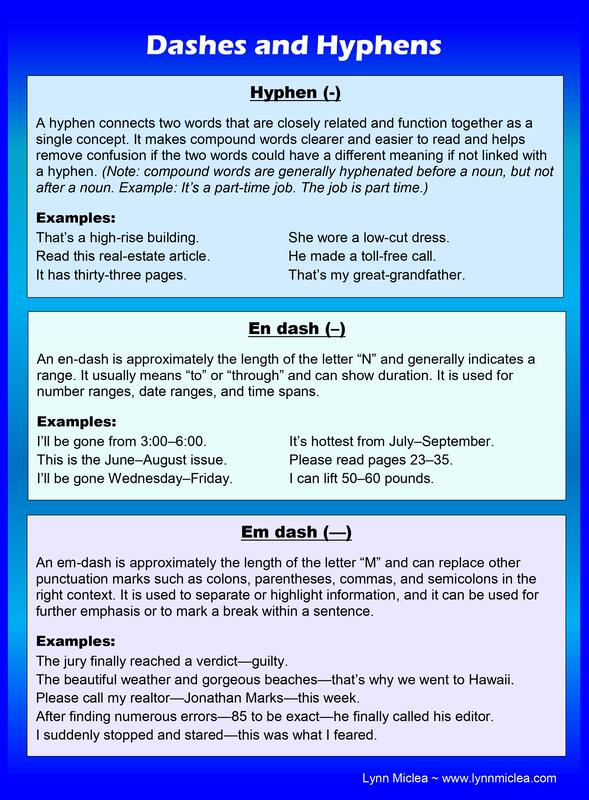
Dashes and Hyphens
Kangaroo Words
A kangaroo word is a word that contains a synonym or similar word inside it. For example: "chicken" contains the word "hen" within it. Following is a chart showing many more kangaroo words.
A kangaroo word is a word that contains a synonym or similar word inside it. For example: "chicken" contains the word "hen" within it. Following is a chart showing many more kangaroo words.
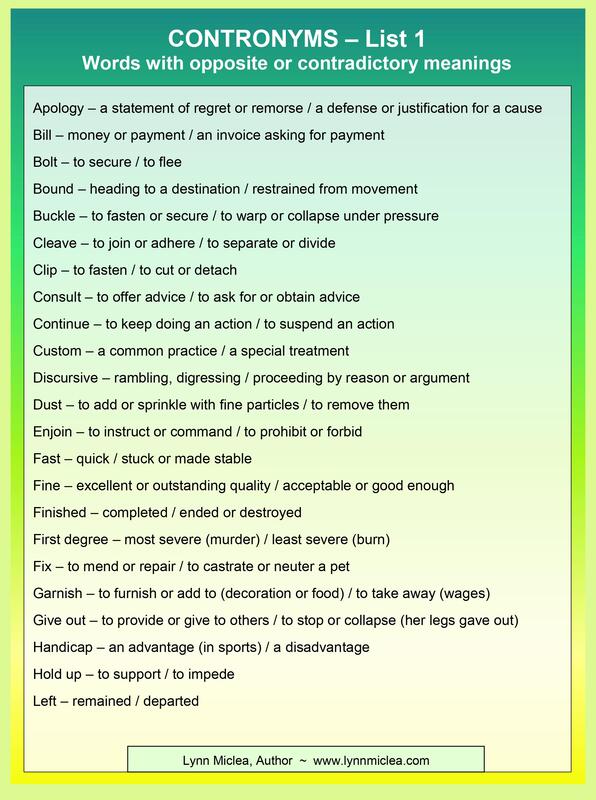
Contronyms
Contronyms are words that have opposite or contradictory meanings.
Here are two charts that show examples of contronyms.
Here is List 1 of these words.
Contronyms are words that have opposite or contradictory meanings.
Here are two charts that show examples of contronyms.
Here is List 1 of these words.
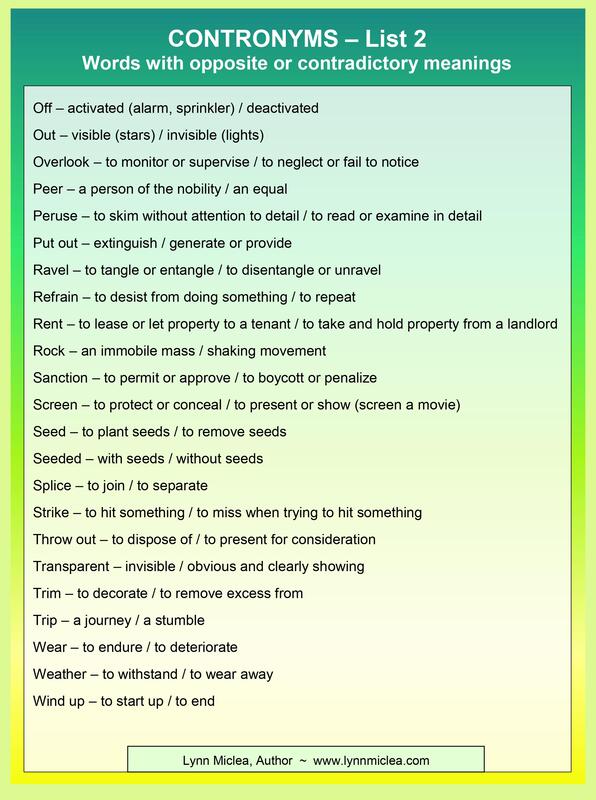
Contronyms
Here is List 2 of these words.
Here is List 2 of these words.
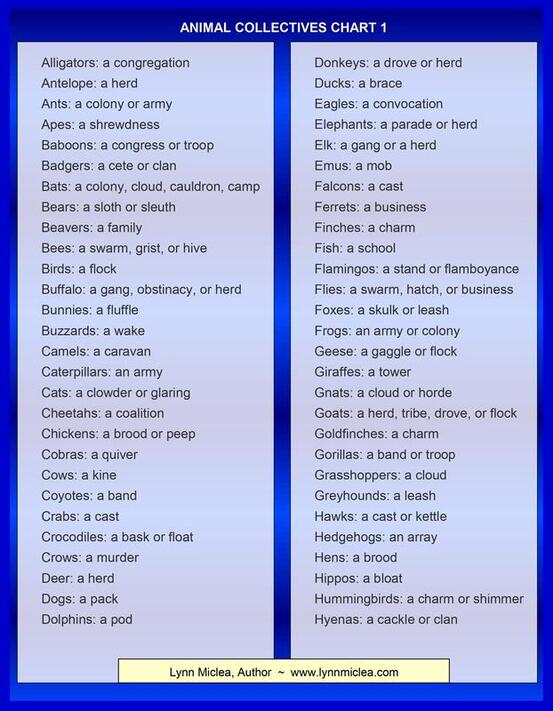
Animal Collectives
Animal groupings have very interesting names.
Here are a few of them.
Animal groupings have very interesting names.
Here are a few of them.
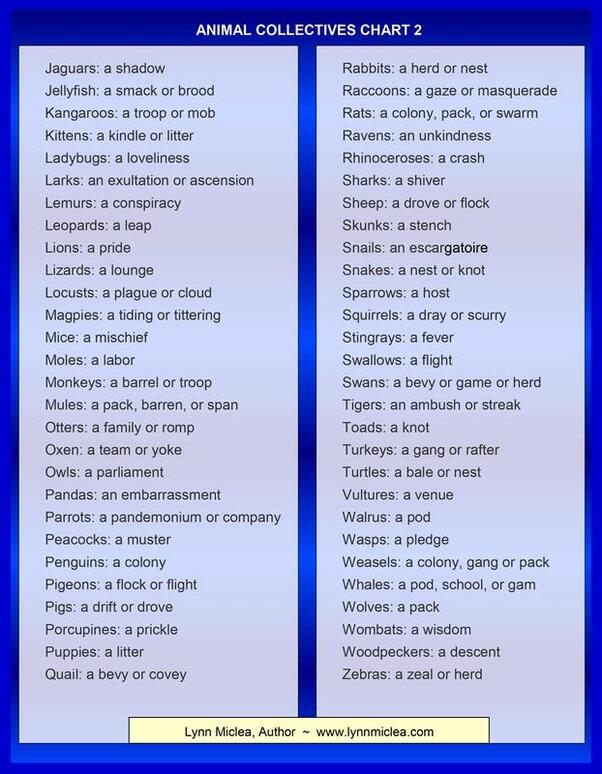
And here are a few more...
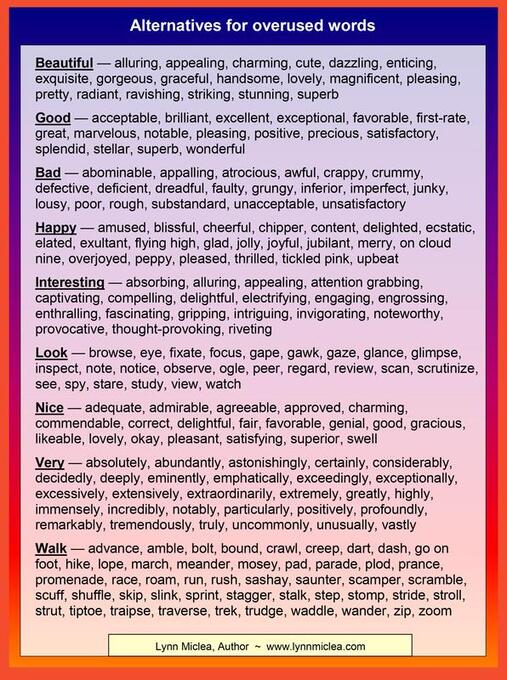
Alternative Words
There are times in our writing when we tend to use the same words over and over. It can get repetitive and boring, and it's a good idea to vary the words we use. It is also a good idea to choose the proper word to convey the meaning that we intend.
Keeping the thesaurus open when you write is a great way to help you find alternative words so that your writing is more precise, interesting, and not repetitious.
Here are a few alternative words.
There are times in our writing when we tend to use the same words over and over. It can get repetitive and boring, and it's a good idea to vary the words we use. It is also a good idea to choose the proper word to convey the meaning that we intend.
Keeping the thesaurus open when you write is a great way to help you find alternative words so that your writing is more precise, interesting, and not repetitious.
Here are a few alternative words.
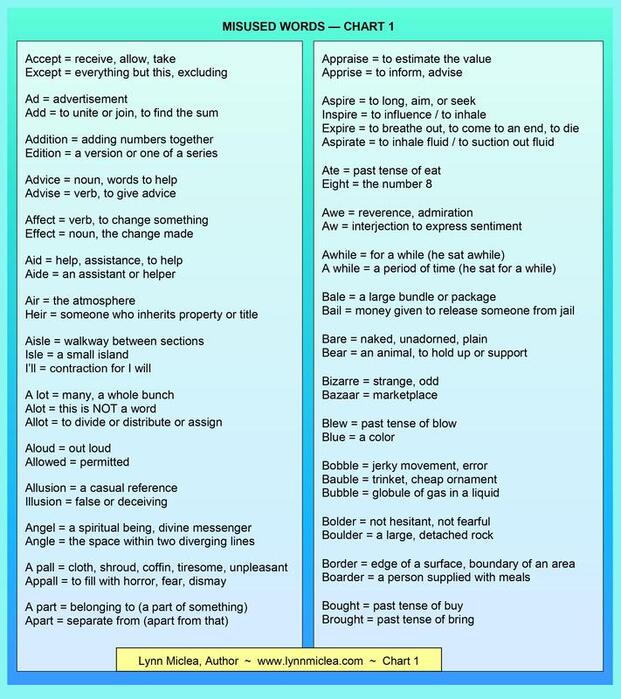
Words that often get confused
There are quite a few words that many people tend to get confused and mixed up, and these words are often used incorrectly.
The words may sound the same or similar, but they have very different meanings.
Here are a few charts of some of the most commonly mixed-up words.
Here is Chart 1.
There are quite a few words that many people tend to get confused and mixed up, and these words are often used incorrectly.
The words may sound the same or similar, but they have very different meanings.
Here are a few charts of some of the most commonly mixed-up words.
Here is Chart 1.
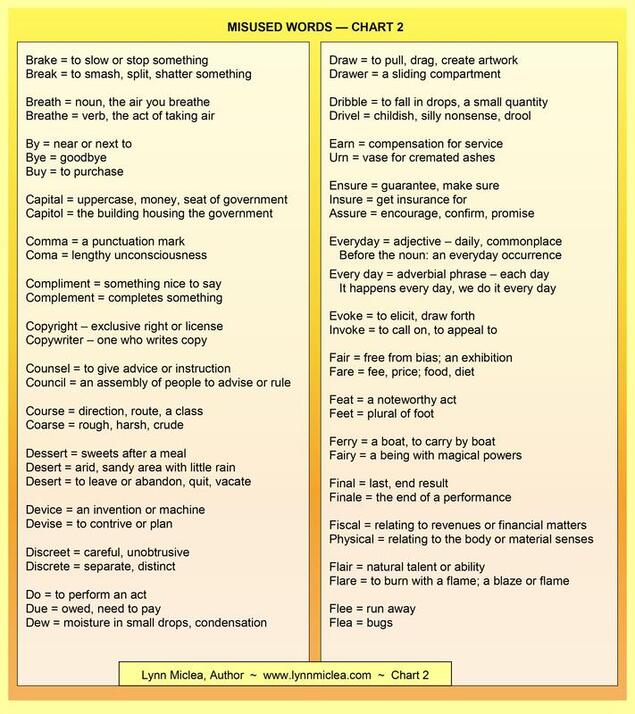
Chart 2
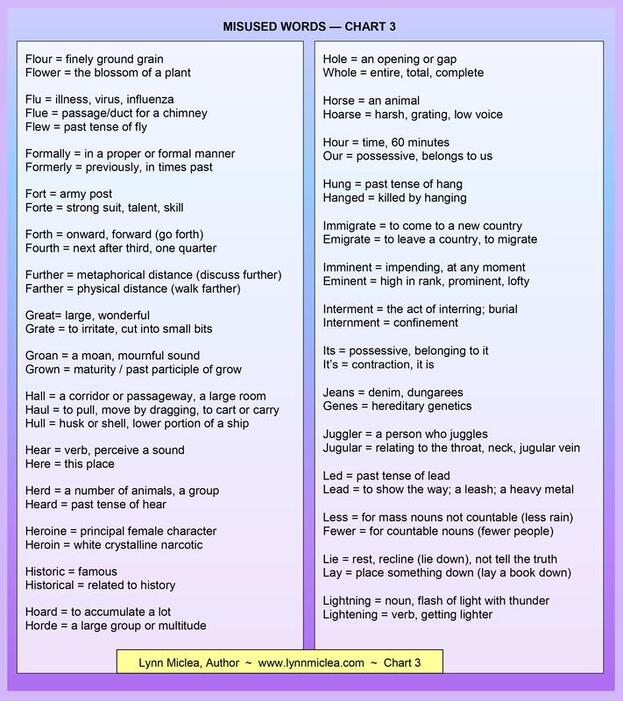
Chart 3
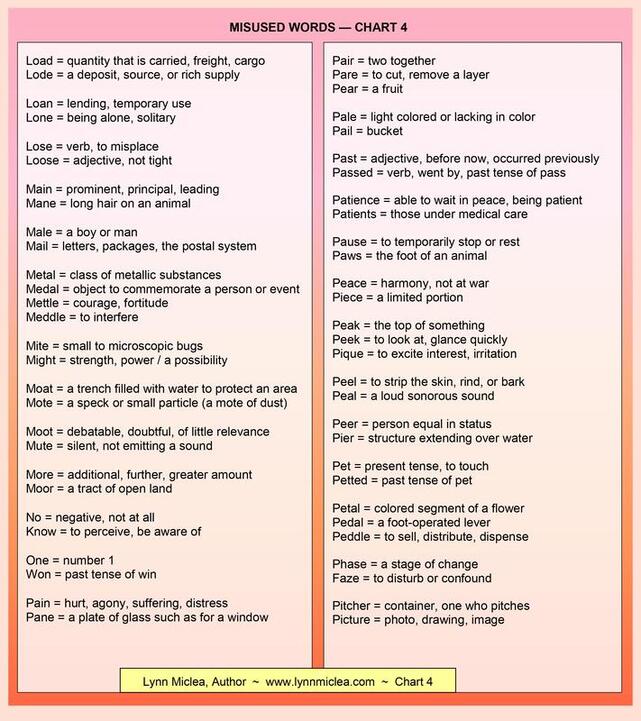
Chart 4
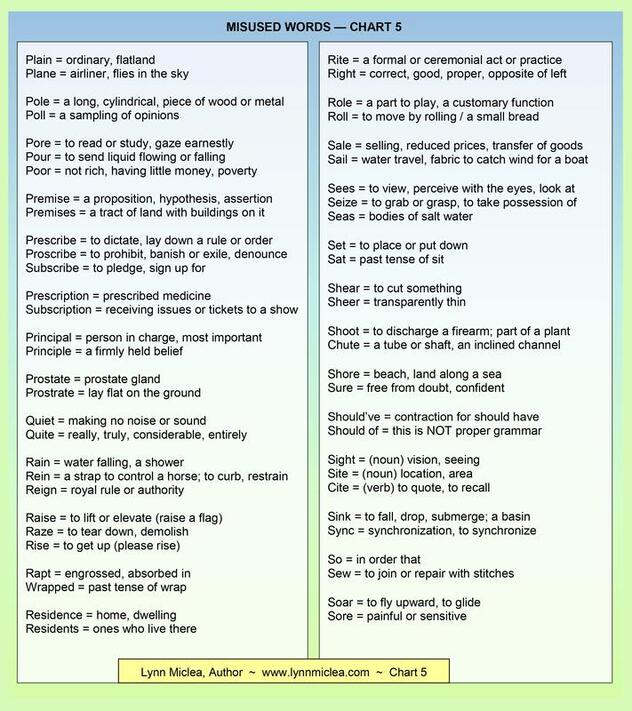
Chart 5
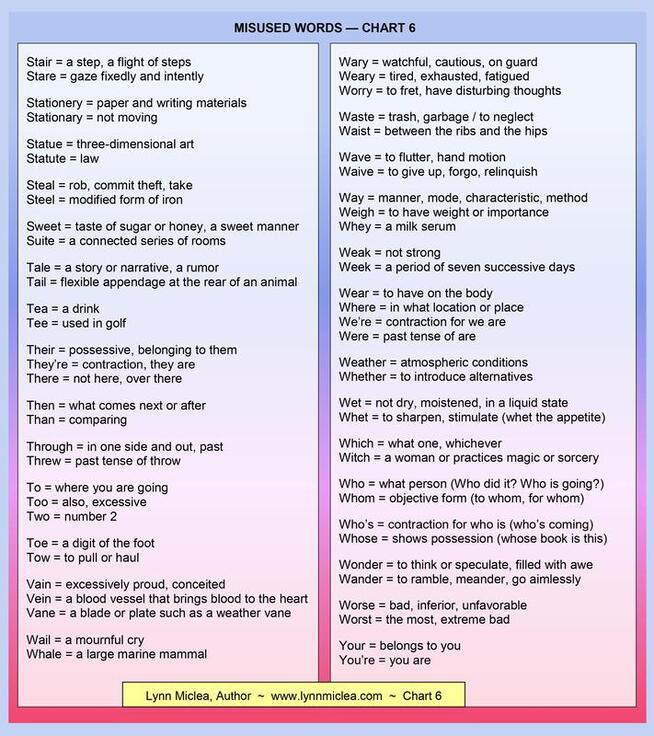
Chart 6
Lynn hopes these tips and tidbits are useful and helpful to you.
For these and much more, please order her Grammar Tips book, found on the non-fiction tab above.
Or click on this link to get the book on Amazon: Grammar Tips Book
Thank you!
Copyright © 2013-2024 Lynn Miclea. All Rights Reserved.
